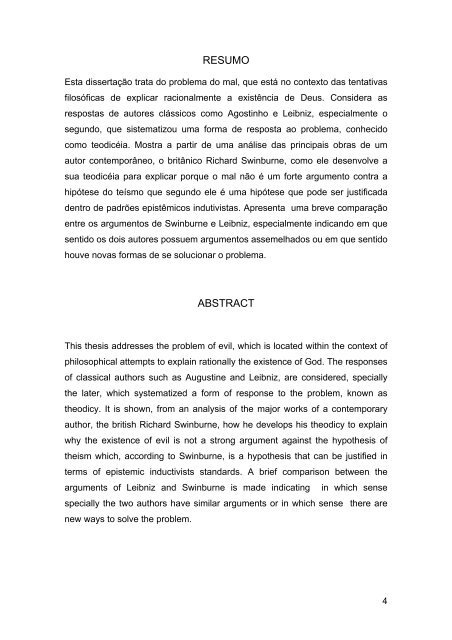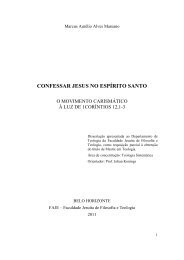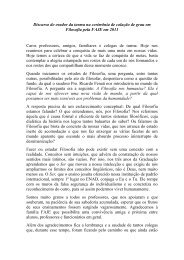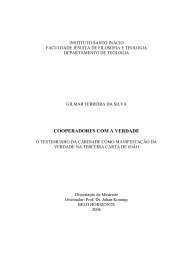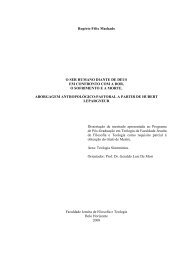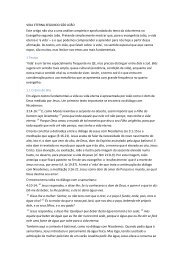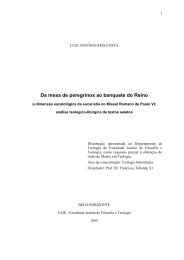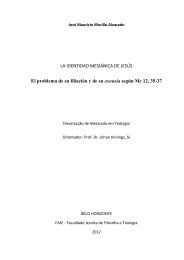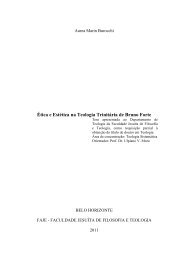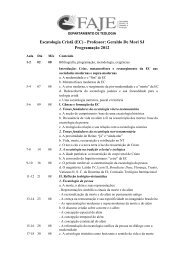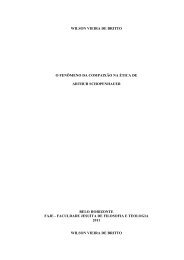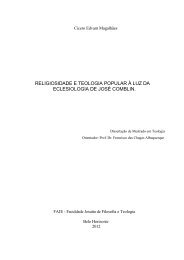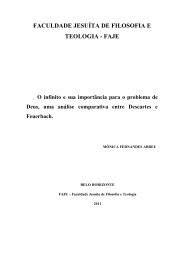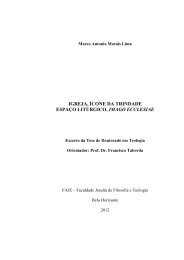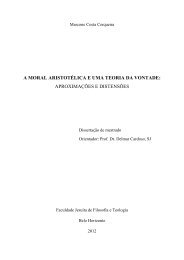o teÃsmo e o problema do mal em richard swinburne - FaJe
o teÃsmo e o problema do mal em richard swinburne - FaJe
o teÃsmo e o problema do mal em richard swinburne - FaJe
You also want an ePaper? Increase the reach of your titles
YUMPU automatically turns print PDFs into web optimized ePapers that Google loves.
RESUMO<br />
Esta dissertação trata <strong>do</strong> <strong>probl<strong>em</strong>a</strong> <strong>do</strong> <strong>mal</strong>, que está no contexto das tentativas<br />
filosóficas de explicar racionalmente a existência de Deus. Considera as<br />
respostas de autores clássicos como Agostinho e Leibniz, especialmente o<br />
segun<strong>do</strong>, que sist<strong>em</strong>atizou uma forma de resposta ao <strong>probl<strong>em</strong>a</strong>, conheci<strong>do</strong><br />
como teodicéia. Mostra a partir de uma análise das principais obras de um<br />
autor cont<strong>em</strong>porâneo, o britânico Richard Swinburne, como ele desenvolve a<br />
sua teodicéia para explicar porque o <strong>mal</strong> não é um forte argumento contra a<br />
hipótese <strong>do</strong> teísmo que segun<strong>do</strong> ele é uma hipótese que pode ser justificada<br />
dentro de padrões epistêmicos indutivistas. Apresenta uma breve comparação<br />
entre os argumentos de Swinburne e Leibniz, especialmente indican<strong>do</strong> <strong>em</strong> que<br />
senti<strong>do</strong> os <strong>do</strong>is autores possu<strong>em</strong> argumentos ass<strong>em</strong>elha<strong>do</strong>s ou <strong>em</strong> que senti<strong>do</strong><br />
houve novas formas de se solucionar o <strong>probl<strong>em</strong>a</strong>.<br />
ABSTRACT<br />
This thesis addresses the probl<strong>em</strong> of evil, which is located within the context of<br />
philosophical att<strong>em</strong>pts to explain rationally the existence of God. The responses<br />
of classical authors such as Augustine and Leibniz, are considered, specially<br />
the later, which syst<strong>em</strong>atized a form of response to the probl<strong>em</strong>, known as<br />
theodicy. It is shown, from an analysis of the major works of a cont<strong>em</strong>porary<br />
author, the british Richard Swinburne, how he develops his theodicy to explain<br />
why the existence of evil is not a strong argument against the hypothesis of<br />
theism which, according to Swinburne, is a hypothesis that can be justified in<br />
terms of epist<strong>em</strong>ic inductivists standards. A brief comparison between the<br />
arguments of Leibniz and Swinburne is made indicating in which sense<br />
specially the two authors have similar arguments or in which sense there are<br />
new ways to solve the probl<strong>em</strong>.<br />
4


